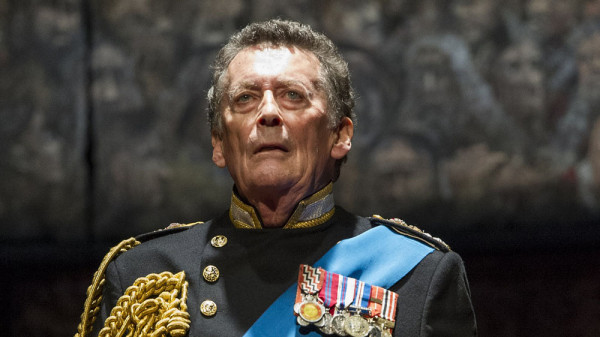It begins in silence, with brief candles… and a party of twelve, looking for all the world like the Last Supper, shortly after Judas the Betrayer has legged it.
And in Jesus of Nazareth’s position, we have Robert Powell, a weary yet still steely Prince Charles, soon to be crucified by the ones he seeks to protect.
It’s often said that if Shakespeare was still writing today, he’d be working on episodes of EastEnders, whereas it’s more likely that he’d simply be continuing to produce epic plays that are preoccupied with our Royal dynasties while at the same time having something savagely satirical to say about the way we live our lives.
So is it is with the central joke of King Charles III, a ‘future history play’ written in the style of the Bard himself. The fallout resulting from the death of Elizabeth II is delivered in blank verse, and while you might want to argue that nothing in Doctor Foster writer Mike Bartlett’s text quite matches the poetry of, say, Hamlet, it’s impossible to avoid the puckish thought that Shakespeare would have delighted in throwing out a soliloquy or two about kebab joints and sexting.
Robert Powell is a tired but dedicated king. Powell is not interested in a caricature portrayal (apart from anything, at one point he’s faced with the Spitting Image version of Charles). There are shades of Macbeth running through the play, but Powell’s king most closely resembles Lear: faced with everyone else’s hard-nosed pragmatism, Charles doggedly chooses a more idealised path – while everybody else can only see the purpose of a Royal family if they remain irrelevant, Charles decides to throw off his mother’s hollow crown and become much more than a mere figurehead.
When that isn’t immediately successful, the king delivers a genuine sucker punch to end Act Two. What the king sees as moralistic, his subjects – whipped up by the tabloids – perceive as naïve stupidity. In true tragedian fashion, Charles has ironically been seeking to protect the freedom of the press that will aid his downfall.

There are some very good jokes – usually in the lookalike casting of the royals, or in sly throwaway gags: Charles references an infamous line from a pre-wedding interview of the eighties, or, when pouring tea for his first meeting with the Prime Minister, innocently asks ‘Shall I be mother?’ There are lines that are worthy of the Bard himself, including a line that involves genuinely looking a gift horse in the mouth.
The king, bored of spending an entire life being an ‘empty vessel waiting for instruction’, sees his destiny to serve, and he fully intends to act on that destiny, rather than simply be a face on currency (one scene has a character ruefully observe that the money in his pocket has turned into a historical document overnight).
Charles reminds us that his government has put themselves up for election, whereas he – born into the Royals – was chosen by God. Robert Powell is engaging and charismatic, and while the play has the tragedian sense of futility, we never question that he’s doing the right thing. Jennifer Bryden as Lady Macbeth Kate has valid points to make too, recognising that the media’s dismissal of her as a plastic princess gives her and her husband hard currency in the modern world. Lucy Phelps, despite being dealt the subplot from King Ralph, is superb and romantic, while Richard Glaves has possibly the greatest tragedy as Harry (at least, unlike his father, he has an outside chance of escaping).
It’s tempting to imagine this in London’s Globe Theatre, but Tom Scott’s superb set invokes both tradition and an inescapable suffocation. The entire piece is compelling, involving and all too believable. Long live the king.
Performed on Monday 8 February 2016 at Brighton Theatre Royal.
> Buy tickets at atgtickets.com/brighton or by phoning 0844 871 7650.
Have you seen the show? Let us know below…

